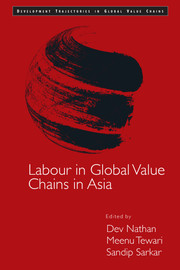21 - The Double Movement of Labour in the Re-formation of GVCs
from Conclusions
Published online by Cambridge University Press: 23 July 2017
Summary
Introduction
We began this book with a question about how employment relations are shaped and reshaped within a GVC world. We posed this question in the context of supplier firms in developing countries. That is, firms that produce intermediate products or carry out processes on contract for one or a few lead firms. Such firms, bound in contractual supply relationships within GVCs generally do not sell their product on the open market. As in other developing countries, such supplier firms have come to dominate the GVC landscape across Asia. What then are the implications for labour, working conditions and upward mobility for GVC-linked production within such ‘supplier countries?’ To address this question, we laid out a framework of GVC analysis in terms of ‘vertical’ relations between lead and supplier firms, and ‘horizontal’ relations between suppliers and labour. Vertical relations captured issues of distribution (i.e., of surplus across a value chain) as well as firms’ business practices. Horizontal relations included wage determination and GVC interactions with national institutional contexts and norms.
Relations between lead firms and suppliers were in turn mapped on to and encapsulated within different forms of GVC governance. By governance we mean the management of relationships between lead firms and independent firms located at different nodes of the value chain, as well as the management of distribution and marketing. The intersection of these vertical and horizontal relationships, we argued, produced the differentiation and variation in outcomes experienced by different kinds of workers in different sectors, segments and geographies. These experiences are hardly static. The same vertical and horizontal intersections within GVCs and their juxtaposition with national institutions and norms have also helped transform the agency of work and workers themselves. Over time, these shifting interactions and the evolving agency of workers have also given rise to new spaces of protest, worker pushback, resistance and reform within GVCs, however, incremental or in-process they might be.
The individual case studies that form the core of this book illustrate this broad arc of change within GVCs with evidence drawn from Asia. They examine labour conditions in a variety of sectoral GVCs (agro-foods, garments, tourism, electronics, automobiles, call centres and IT software services) and in a number of Asian countries (Bangladesh, Cambodia, China, India, Indonesia, and Vietnam).
Information
- Type
- Chapter
- Information
- Labour in Global Value Chains in Asia , pp. 503 - 534Publisher: Cambridge University PressPrint publication year: 2016
